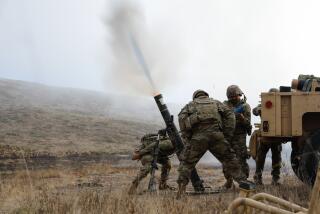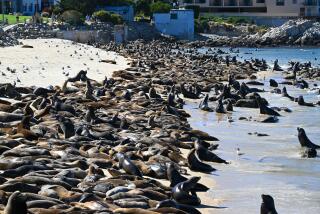Volunteers Help Clear Island So That the Least Benefit the Most
HUNTINGTON BEACH — With Mother Nature’s full cooperation, a group of more than 75 volunteers spent Saturday morning clearing weeds and brush from a small island in the Bolsa Chica Ecological Reserve--a process designed to make it easier for endangered birds to nest when they arrive later this month.
“Fortunately, we had great weather,” said Esther Burkett, a wildlife biologist who supervised the activities. “With all of the predictions about rain, we were a little concerned that we might not be able to pull this off.”
Since 8-foot-deep water separated the island from shore, volunteers had to be taxied out by rowboat.
But getting across the water didn’t mean their troubles were over. There were still several yards of green moss and mud to negotiate by foot before getting to the workstations.
“I wish I had boots on right now,” said volunteer Cyndi Russell as she carefully trudged through a patch of soft green moss an inch deep.
The island was one of two built by the state to help save the endangered least tern, which migrates each year from Central and South America.
The islands must be cleared of all vegetation before breeding season because the birds won’t nest near any type of foliage.
The island being cleaned on Saturday was originally meant for the least tern. But in recent years, the tiny gull-like birds have been forced to nest at a smaller island within the reserve because the larger one has been taken over by elegant terns and Caspian terns, two species that are not endangered but are rare in California.
“For some reason, the larger terns started nesting here four years ago; they just flocked in here,” said Burkett, the California Department of Fish and Game’s wildlife biologist in Orange County. “We clear the bigger island because as long as it’s ready, the big guys will come here and leave the other island to the least terns.”
While most people worked in groups, Walter Johnson, 75, worked in a corner, alone. The retired industrial engineer called the reserve “a sentimental place” as he recalled how he used to go duck hunting in the Bolsa Chica area during the 1930s.
“I’m here today because all kinds of animals are going towards extinction,” said Johnson, a 10-year member of Amigos de Bolsa Chica, which helped sponsor the cleanup. “If we can save some of them, I think we prolong our own existence.”
Andy Kuhlman, 9, tugged at his red turtleneck sweat shirt while he took a short break from the morning’s activities. He had spent the last five minutes attacking what looked like a giant tumbleweed.
“I just came out here to get rid of these ugly weeds,” the third-grader said. “The birds can’t nest with all of these weeds so we need to help them.”
Kuhlman was one of about a dozen students from Pegasus School in Huntington Beach who came to the wetlands with their science teacher, Adrianne White.
“I think kids are very open to this kind of activity right now,” White said. “If they grow up with these ideas about saving the Earth and animals, they will be able to pass it on to future generations.”
Although Saturday’s cleanup was a success, there is some concern about maintaining the fragile nesting area during the breeding season because Burkett, 33, has accepted a promotion in Sacramento and won’t be replaced for several months.
For the past four years, it has been Burkett who has kept a watchful eye on the islands, returning with a small group once a week following the initial cleanup to remove any weeds that have grown back.
“Even though it looks good right now, in the spring everything starts to grow back,” said Burkett.
More to Read
Sign up for Essential California
The most important California stories and recommendations in your inbox every morning.
You may occasionally receive promotional content from the Los Angeles Times.










